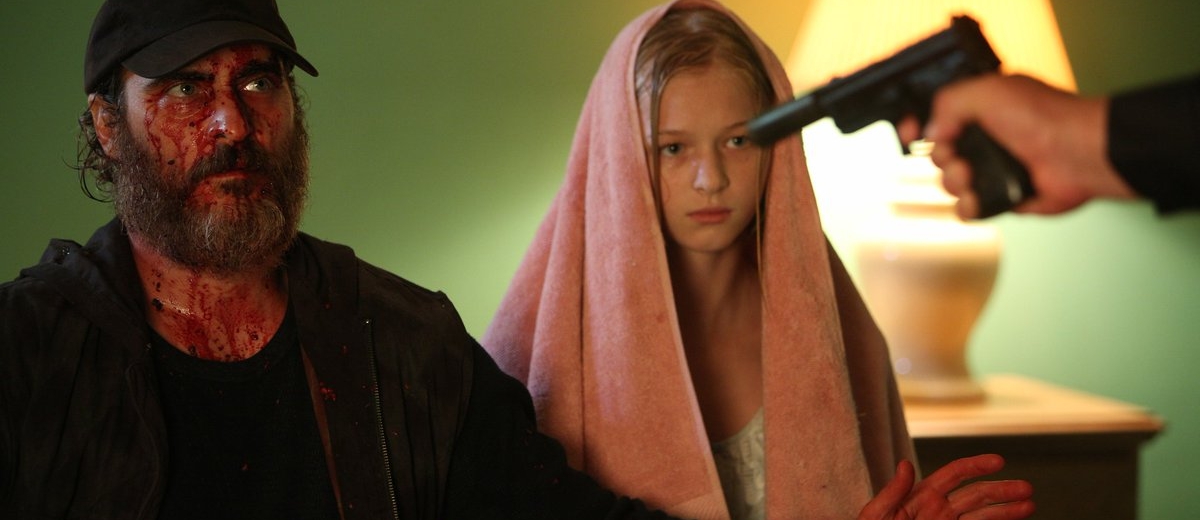It would be doing a disservice to the filmmakers to describe You Were Never Really Here as just an arthouse update of the dad-movie “man rescues girl from sex slavery” trope made recently popular by films like Taken. Lynne Ramsay’s latest film is so, so much more than that. It’s a meditation on depression and suicide through the trappings of something that ends up much more in line with Martin Scorsese’s Taxi Driver and centers around a character that feels like he belongs in purgatory with the dozens of broken male protagonists that sprinkle the works of Paul Schrader. You Were Never Really Here manages all of this without ever feeling like it is riffing on or referencing these works, instead Lynne Ramsay takes seeds of ideas planted by these works and grows them into her own twisted vision filled with somber melancholy and desperate revenge.
Ramsay’s emotionally stunted man on a mission, in this case, is Joaquin Phoenix as PTSD-riddled former combat veteran Joe.
Joe is a contract killer who specializes in rescuing kidnapped young girls. He’s a man whose reputation is that he can be brutal, physically destroying the men who prey on these young girls. When a New York senator calls about his missing daughter, Joe is told to “hurt them” — to make them pay for their transgressions.
And hurt them Joe does. Phoenix, who continues to be the most fascinating actor currently working since his post-I’m Still Here comeback, oozes with menace. He looks like a grizzly bear, bulky and shaggy. His killing style, wonderfully accented by Ramsay’s choices to use security footage and deliberate edits, is to simply overpower those who he was sent to kill. Not with grace or tact or wit, merely to push over, tackle, and pulverize with his weapon of choice: a ball-peen hammer.
He isn’t in these rooms because he’s a good samaritan or a vigilante with a heart of gold. Joe is a fundamentally shattered human being. He’s seen things in war that people can’t imagine. He was abused as a child. He struggles to take care of his mother, the final vestige of a “normal” life. Suicide is Joe’s strongest temptation, and pushing himself to the edge of that is his biggest vice.
We see him put his head in front of an oncoming train early in the film, and a recurring motif is Joe attempting to breathe with his head encased in a plastic bag. He wants to die, but can’t bring himself to do it.
The miracle of You Were Never Really Here is that all of this character work is done without the film holding our hand and verbalizing themes and motivations. Lynne Ramsay does an incredible job of using editing, cinematography, acting, and framing to convey the thoughts, actions, motives, and internal life of Joe, who rarely speaks. Likewise, Phoenix uses his entire being, head to toe, to embody Joe’s despair-fueled barbarism.
It’s a masterfully crafted character study that just so happens to also be a savage and twisty thriller.
You Were Never Really Here shines hardest when it intimately is focused on Joe. The film, great as it is, struggles hardest when the plot is laid bare and the focus shifts from Joe’s internal demons to the sickening villains of the real world. To her credit, Ramsay doesn’t linger on this long, merely featuring a quick montage to explain how A got to B and hastily bringing the film’s spotlight back to Joe’s journey. The plot machinations are merely a means to understand the character of Joe. Ramsay’s film is the epitome of Ebert’s quote “It’s not what a movie is about, it’s how it is about it.”
This is a film that wants you to bask in its visuals, characters and themes, not recite plot points and minutiae. Who did it? Who cares. What matters is what everything means to Joe and how the story affects him. Lynne Ramsay doesn’t want us to explore the world of You Were Never Really Here as bystanders and witnesses recounting events. We aren’t here to luxuriate in violence or revel in the lurid world of child abduction and sex slavery. This isn’t Taken where we’re rooting for the divorced dad to save the day against those filthy Eastern European pedophiles. We are really here because Ramsay has invited us to sit in the psychologist’s chair, opposite Phoenix’s Joe, and try and understand him, to really get at the heart of his twisted psychology.








